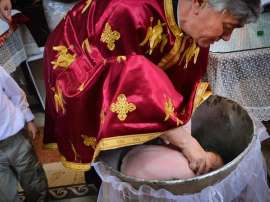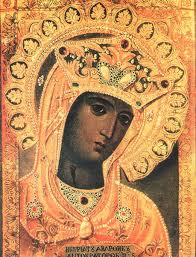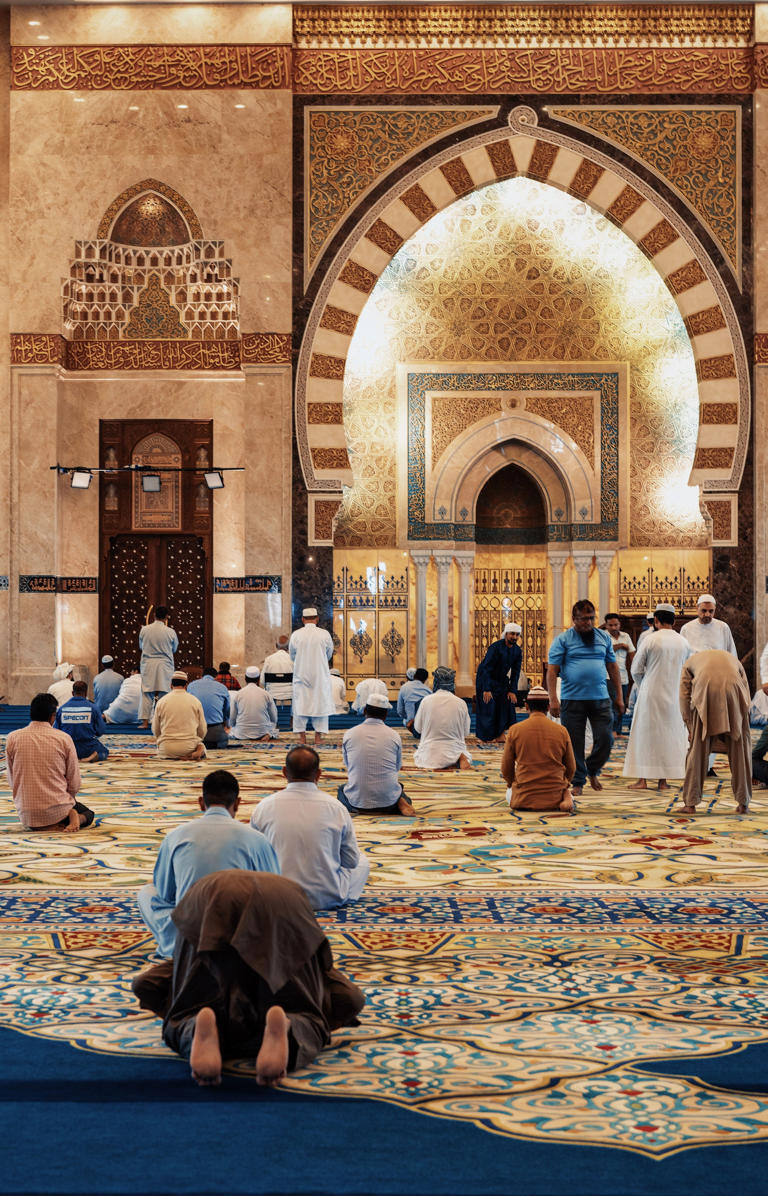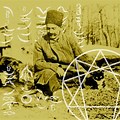Portugal church sex abuse study finds 512 alleged victims









Portugal church sex abuse study finds 512 alleged victims
A committee examining historic child sex abuse in the Portuguese Catholic Church says 512 alleged victims have come forward.
Senior church officials had previously claimed that only a handful of cases had occurred.
The Independent Committee for the Study of Child Abuse in the Catholic Church, set up by Portuguese bishops just over a year ago, looked into alleged cases from 1950 onward. The panel produced its final report Monday. Portuguese bishops are due to discuss the report next month.
The statute of limitations has expired on most of the alleged cases. Only 25 allegations were passed to prosecutors, the panel said.
The report came four years after Pope Francis gathered church leaders from around the world at the Vatican to address the sex abuse crisis in the church. That meeting was held more than 30 years after the scandal first erupted in Ireland and Australia and 20 years after it hit the United States.
Bishops and other Catholic superiors in many parts of Europe at the time continued to deny that clergy sex abuse existed or insisted on giving little weight to the problem.
Pedro Strecht, a psychiatrist who headed the panel in Portugal, said it estimates the true number of victims during the period is at least 4,415. He didn't explain how the extrapolation was made.
The panel is not publishing the names of the victims, the identities of the alleged abusers, or the places the abuses allegedly happened. However, it is to send to bishops by the end of the month a list of alleged abusers who are still active in the church.
The final report includes a separate – and confidential – annexe of all the names of church members reported to the committee that is being sent to the Portuguese Bishops Conference and to the police.
The Portuguese church hasn’t said whether it intends to pay compensation to any victims.
The report said that 77 per cent of the abusers were priests, with other perpetrators being linked to church institutions.
It said 48 per cent of those who came forward had spoken about the abuse for the first time. Most of the alleged victims were male, though 47 per cent were female, the report said.
It said there were places in Portugal, such as some seminaries and religious institutions, that were “real blackspots” for abuse.
The panel recommended that the statute of limitations on such crimes be extended to at least 30 years from the current 23 years.
Ramadan 2023: When is it and what does it celebrate?









Ramadan 2023: When is it and what does it celebrate?
The blessed month of Ramadan, a time of reflection, contemplation, and celebration for Muslims all over the world, is almost here.
The annual observance of this special month is regarded as one of the Five Pillars of Islam and commemorates Muhammad’s first revelation.
The Islamic calendar is based on lunar cycles, unlike our Gregorian calendar, so the exact dates of Ramadan change every year.
Here’s everything you need to know about this year’s Ramadan, including what the special occasion is all about and when it will be celebrated.
What is Ramadan?
Ramadan is held during the ninth month of the Islamic calendar and is a time for spiritual reflection, acts of charity, and spending time with loved ones.

Ramadan remembers the month the Quran was first revealed to the Prophet Muhammad. The night the Quran was revealed is known as Lailut ul-Qadr (‘The Night of Power’).
Throughout the Ramadan period, adult Muslims of able body and mind start their day fasting, with a pre-dawn meal known as ‘suhur’.
The fasting involves abstaining from eating, drinking, and sexual intimacy until sunset.
Many observers also choose to stay away from smoking, taking medicine, and chewing gum during this time.
Those who are acutely or chronically ill, diabetic, menstruating, breastfeeding, or pregnant are not expected to fast, as well as children who haven’t hit puberty yet and the elderly.
During this time, studying the Quran, donating money to the needy, and committing more time to prayers are encouraged.
The fasting period concludes after sunset with a meal called “iftar”, which sees families and friends come together around the dinner table.
When is Ramadan 2023?
As the Islamic calendar is based on the lunar cycle, Ramadan rotates by approximately 10 days each year.
This year, Ramadan begins on the evening of Wednesday, March 22, and concludes on Friday, April 21.
When is Eid al Fitr 2023?
Eid al-Fitr is a festival that marks the end of Ramadan.
This year, it is set to begin on the evening of Friday, April 21, and will last until the evening of Saturday, April 22.
What is Eid al-Adha and when does it start?
Eid al-Adha, also known as the Greater Eid, is regarded as the second-most important festival in the Muslim calendar.
Observed by Muslims around the world, it marks the culmination of the annual pilgrimage to Mecca and commemorates Abraham, who was willing to sacrifice his son in order to obey God, but was stopped by God who provided him with an animal to sacrifice instead.
To commemorate this, Muslims feast on an animal but will divide it into three parts. They give one part to the poor and those in need, one part to friends, and keep one part to have with their family.
This year, Eid al-Adha will be held between Wednesday, June 28 and Sunday, July 2.
Pope lands in South Sudan to urge peace as fighting kills 27








Pope lands in South Sudan to urge peace as fighting kills 27
Pope Francis has arrived in South Sudan for the second and final leg of his African pilgrimage, seeking to encourage the young country’s stalled peace process.
South Sudan’s president, Salva Kiir, greeted Francis at the international airport in the capital, Juba, as thousands ululated and sang in 35.5C heat.
The airport road was lined with Christians, Muslims and traditional dancers waving Vatican, South Sudanese and British flags. Some wore T-shirts with a portrait of the pope.
“The pope is closest to God,” Poni Jadalla, 45, said as she waited to welcome Francis.
“Let the pope give us peace so that this country can develop and no more bloodshed.”
The Archbishop of Canterbury, Justin Welby, and the Moderator of the General Assembly of the Church of Scotland, the Rt Rev Iain Greenshields, are joining Francis in South Sudan for a novel ecumenical push for peace.
Together, the three represent the religious leadership of the overwhelmingly Christian country, the world’s youngest, which gained independence from the majority Muslim Sudan in 2011 but has been beset by civil war and conflict.
The Christian leaders are aiming to give a joint call for South Sudan’s political leaders to put aside their differences and work for the good of their people.
Continued fighting, including attacks this week in the south that killed 27 people, has displaced some two million people and hampered implementation of a 2018 peace deal, but residents said the arrival of Francis gave them hope.
“The pope will bring us peace,” said Monica Lado, a 40-year-old from Juba, on the eve of the three leaders’ arrival.
Francis travelled to South Sudan from Congo, where he had a final appointment on Friday in Kinshasa with Congo’s bishops.
On Thursday, the pope received an enthusiastic response at a stadium event where he encouraged young people to work for a peaceful and honest future.
A group of about 80 Catholics from South Sudan’s central city of Rumbek walked for nine days, covering an estimated 190 miles, and arrived in Juba to cheers on Thursday.
The pilgrims were sore, tired and had blisters, but said they hoped to attend Francis’ big Mass on Sunday and take back blessings to their homes and families.
“As the pope is coming, I believe what was killing us will stop,” said a smiling Victoria Yar, 58, as she sat in a plastic chair to rest after the long journey.
Another pilgrim on the trek, Mary Yom, a mother of eight, lost two children to violence.
“Our country is being destroyed by the conflict and we hope that the pope is coming with peace, and no one will be killed again,” she said.
Francis and Mr Welby first announced plans to visit South Sudan in 2017, but security concerns repeatedly thwarted the trip.
In an effort to move the process forward, Francis presided in 2019 over a joint prayer in the Vatican and famously got down on hands and knees and kissed the feet of South Sudan’s rival leaders, begging them to make peace.
But fighting continues, evidence of the violence that simmers in communities at times awash with arms and ethnic tensions in one of the world’s poorest countries.
At least 27 people were killed this week in Central Equatoria state’s Kajo-keji, in the latest communal violence between cattle herders and other residents.
Kajo-keji county commissioner Phanuel Dumo called the attack “barbaric” and urged calm.

Overall, the International Committee of the Red Cross (ICRC) this week reported an influx of wounded patients in recent months due to renewed clashes across the country.
“We see terrible injuries, and often airlifting patients from remote areas is the only way to save their lives,” said ICRC Juba delegation head Pierre Dorbes.
In comments on local Eye Radio on Thursday, South Sudan’s president vowed the country would never go back to war as long as he was in power.
“The coming of the Holy Father to South Sudan is your prayers that have brought him,” Mr Kiir said.
But part of the stall in implementing the peace accord is continued political friction between Mr Kiir and deputy Riek Machar, who led opposition forces during the country’s civil war and has long been interested in holding power himself.
Lack of political will has been cited by critics for the slow implementation of the deal in a country also hampered by alleged widespread official corruption.
In Juba, Francis is widely expected to repeat his call for both men and all parties in South Sudan to commit to making progress on the accord.
Already, delays forced the postponement of the country’s first presidential election for another two years.
One million flock to Pope’s Congo Mass on day of peace and forgiveness










One million flock to Pope’s Congo Mass on day of peace and forgiveness
An estimated one million Congolese people have poured into the capital’s main airport for Pope Francis’ first big Mass in Africa, on a day dedicated to his call for peace and forgiveness in a country wracked by decades of violence.
Many of the faithful spent the night on the vast airfields of Kinshasa’s Ndolo airport ahead of the first papal visit to the overwhelmingly Christian country since St John Paul II’s last trip in 1985.
The crowds cheered wildly when Francis began a languid loop around the airfields in his open-sided popemobile, some of them running alongside or waving flags.

Many of the women wore dresses and skirts made of pagne, a wax print fabric featuring images of Francis or other religious symbols.
The Wednesday morning Mass was Francis’ first big event in the Democratic Republic of the Congo after he arrived on Tuesday and, in his opening speech to government authorities, condemned the centuries-long plundering of Africa’s mineral and natural wealth by foreign powers.
Later on Tuesday, Francis was to meet with victims of the fighting in Congo’s east, where rebel groups have intensified attacks over the past year as they seek to expand their territory.
Francis had originally planned to visit the North Kivu provincial capital, Goma, but had to cancel the stop due to the fighting that has forced some 5.7 million people to flee their homes, exacerbating a humanitarian crisis in Congo where already some 26.4 million people were facing hunger, according to the World Food Programme.

Fighting in eastern Congo, which has more than 120 armed groups, has simmered for years but spiked in late 2021 with the resurgence of the M23 group, which had been largely dormant for nearly a decade.
The rebels have captured swathes of land and are accused by the United Nations and rights groups of committing atrocities against civilians.
On Tuesday, Francis condemned the fighting and was to repeat his call for peace during his meeting with victims of the conflict.
The appointment was to include a joint call for the victims to pardon their assailants, according to Vatican organisers.
The Vatican estimated that one million people were on hand for Francis’ Mass, citing local officials.
The airport fields had a capacity of 1.5 million people and were not full by the time Francis’ Mass began.
Articles-Latest
- Koran burning conviction sparks fury as blasphemy law 'returns to UK'
- Robert Francis Prevost - Pope Leo XIV
- Pope Francis' death follows recent health challenges. Here's what we know about how he died.
- Easter April 2025 - international Celebrations
- The Rule of the twelve psalms -Worthy is the Lamb
- Religion in Africa Before Christianity and Islam
- 6 The Origin of Yahweh
- Dumo Di Milano
- What Did the Crow Tribe Believe In: Discover The Beliefs!
- 7 Reasons Historic Christianity Rejects the Book of Enoch
- 8 Breathtaking Mountain Monasteries Around the World
- Ethiopian Bible is oldest and most complete on earth
- Muhammad Muhammad was a prophet and founder of Islam.
- World Day of the Poor – SVP Christmas Campaign 2024
- Pope Francis to open 5 sacred portals on Christmas Eve — for a ritual that’s never been done before
- The 144,000 in Revelation
- Over 73 dead bodies 'used for meditation', 600 crocs in a pond, found in two Thai temples
- Occultism: Western Occult Tradition
- What is a Mudra
- Blood Sacrifices: Ancient Rituals of Life and Death
Articles-Most Read
- Home
- Let There Be Light
- Plants that feel and Speak
- The Singing Forest
- The Singing Forest-2
- Introduction
- Meditation
- Using Essential Oils for Spiritual Connection
- Heaven Scent
- Plants that Feel and Speak-2
- Purification
- Making the Spiritual Connection
- Anointing
- Essential Oils: The unseen Energies
- The Sanctity of Plants
- The Aroma Of Worship-Foreward
- The Aroma Of Worship - Introduction
- Methods Of Use
- Spiritual Blending
- Handling and Storage









